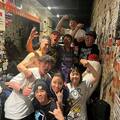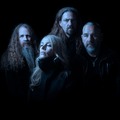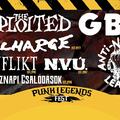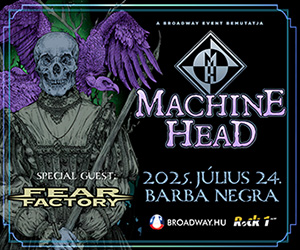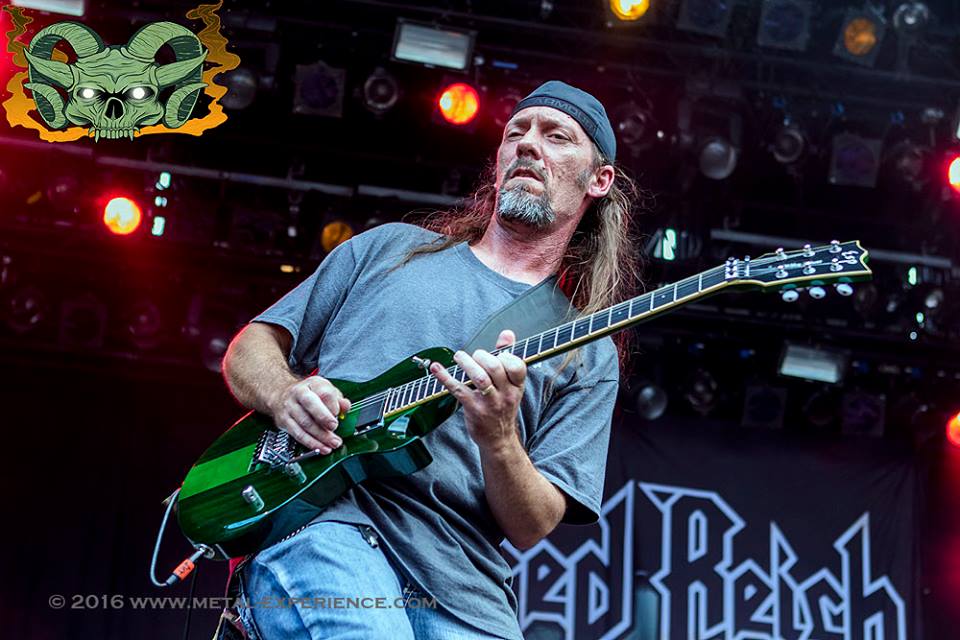
Sacred Reich have been to Budapest supporting Sepultura on June 17 1991. Do you remember that show? Do you have any particular memories of the city and / or country?
Wiley: I do. We were fortunate to have the next day off. We went down and I can’t remember the name of it but that’s an area where there are some beautiful structures, it’s almost like an arc of triumph with statues. And there’s the water where you can rent a boat. We spent three or four hours there that day. We rented the boat and went down, so we really enjoyed it. And when we left, we were like: “It’s the Paris of the East. What a beautiful city.” People were very friendly, the food was very good, a rich culture. It was very memorable. We played there one time, there have been cities that came and gone, I don’t remember. Budapest really sticks out. It’s been very memorable. I remember the crowd was very friendly, we felt very welcome. And then we enjoyed the day off, we were amazed with the architecture, the culture, the food. The day at the square was amazing. Thank you for creating such a memorable city.
Let’s take a look at the band’s history. Sacred Reich has been formed in 1985 but not in the classic line-up yet. Could you tell us the story of the early years of the band?
Wiley: I was the last member to join so I’ll fill you in the best I can before I got there. The only original founding member from the original line-up is Jason Rainey. He pretty much came up with the name Sacred Reich and he created the band Sacred Reich. They did cover songs: Metallica, S.O.D., C.O.C., lots of acronym bands. We all went to the same couple of schools within 5-6 miles of each other so there was a small pool of young aspiring musicians and we were all kind of parading around taking turns playing with each other in different combinations. Sacred Reich were Jason on guitar, Ray Nay on drums, Dan Kelly on vocals, a guy named Lurch on bass and also Jeff Martinek on lead guitar. Slowly, I can’t remember the order, but members were replaced to the point where Phil Rind became the bass player and started pushing for “we should write our own songs. We were playing Iron Maiden, Metallica etc. at house parties all the time so why don’t we write a few songs?” He was the first one to join the band thinking: “Why don’t we do our own music?” He started writing the lyrics. Dan Kelly was still singing but he was having trouble making himself available for rehearsals and, ultimately, for studio. So they were panicked in the studio, they couldn’t get the singer to come in. So Jason Rainey told Phil: “Hey, you wrote the lyrics, you sing them.”
So it wasn’t Phil’s intention to become the singer.
Wiley: No, he was enjoying beginning to write and he had something to say. He had opinions and he’s a good player. But he was the bass player and it was cool that he could write lyrics. He was interested to hear Dan singing them. Dan was unavailable for the rehearsal and then, ultimately, couldn’t come to the studio for the demo tape Draining You Of Life. Phil spontaneously took it on and then at the conclusion, they said: “That sounded pretty good, tell Dan Kelly he’s fired.” Then they started to work the demo tape. At this point, Greg Hall, Jason Rainey, Phil Rind and Jeff Martinek were in the band, so the bass player was the singer.
And how did you join the band?
Wiley: I was aware of them and I thought they were crazy ‘cause I didn’t like the underground speedcore metal. I was a young aspiring guitar player, I was listening to Matthias Jabs and the Scorpions, I really was a fan of Judas Priest and even Ratt and Dokken, the great guitar players. I was big eyes, big ears: “Oh my God, I want to learn all of this.” And when I listened to Slayer, while I appreciated the dark and melodic rhythms but when they started to play solos, I was like “Nah”… Now I look back and I was young and naïve because I couldn’t imagine that a GIT graduate was Slayer, it would be wrong. There’s something expressive and appropriate about the way they solo, Kerry King and Jeff. I think it’s just that at that point, my hunger was for intricate double picking stuff, not mindless things. I wanted to work with a metronome and it wasn’t coming from a lot of the underground metal. Phil approached me and said: “Hey, Jeff Martinek left, Flotsam And Jetsam just got signed and we have an opportunity to warm up for Flotsam in front of their record label.” And they gave me a compliment: “You’re an amazing guitar player, will you please consider doing this with us.” I was like “This is not for me. I want to do Ratt, Dokken, Judas Priest, Scorpions, I want to do solos, I’m trying to do something else. I like what you guys are doing, I appreciate that you’ve come along and you’re playing clubs, I’m not jealous but this is just not my thing. I don’t want to learn Jeff’s solos.” And he goes: ”Just re-write them.” I told him to give me a couple of days to think about it and to give me a demo tape. They were able to give me a tape with no solos. I started playing with it and started hearing what I could do. And then after one day, Phil dropped me off a Testament cassette tape and said: “Check this guy, Alex Skolnick out.” Crazy music, just like the other shit I didn’t care for, and I didn’t mind the lyrics, I still liked the solos. This was really good. Then I started to look at the demo tape thinking how I can be good in this world and developing some solos. And I knew a little bit before them that I wanted to do it. So I did. We played that first show with Liege Lord and eventually we got signed with a record label. Shortly after joining the band, we were offered a spot on Metal Massacre VIII. They said they were going to use the song Sacred Reich from the demo and Phil goes: “O.K. we’re going to re-record it ‘cause we have a new guitar player and he changed the solos.” In a rehearsal, we wrote the first song together with me in the band, which is Ignorance so when we re-recorded Sacred Reich for the demo to get to Metal Massacre VIII, we also recorded Ignorance, the first song we wrote with this line-up. We gave them both to Metal Blade and, to our surprise, they chose Ignorance. That put us on a record for the first time which was very exciting, we were young kids between 17 and 20 years of age, and when I went to the local record store, I was like “Holy shit, the freaking record is out on vinyl, it’s unbelievable!” And it performed well, Metal Blade soon got communication from the fans and the people who buy the records and they said: “We would like to hear a whole record of these guys.” So they approached us and we got a record deal. And the first record was Ignorance.
Was it difficult to make it out of Arizona compared to, let’s say, the Bay Area or New York? Was there a whole underground metal scene in Phoenix or anywhere else in the state of Arizona back then?
Wiley: So often it’s true that timing is everything. I think we owe a great debt of gratitude to Flotsam And Jetsam who would have had a harder time than us. They brought attention to the area. Jason Newsted was amazingly disciplined about it. When we put our demo tape out, he was doing interviews on cassette for college radio and on the back of the cassette, he put our demo tape and then wrote a note: “Hey, check out this other band from Arizona.” He put us in front of a national crowd which supported the Metal Massacre VIII which created demand for more. I don’t have a good internal view of the timing of what was going on in the Bay Area or why it was working for Death Angel, Forbidden or Debbie Abono who was a great manager from that time and her critical role in making things happen to the Bay Area. And think of Gloria Bujnowski, the wife of Max of Soulfly, she’s our original manager. I imagine these are also key players that helped things come alive in the Bay and in Arizona. I think we added momentum and it created opportunities for Atrophy out of Tucson, Arizona which is a very unlikely place to be found for a metal band. But because of the hard work Flotsam did, and how that spun on us, record people were looking at what the hell was going on over there in Arizona. So that created an opportunity for Atrophy which was a well deserved opportunity.
Is it true that Phil has replaced Jason in Flotsam And Jetsam at some point?
Wiley: Yeah, when he went to Metallica, Jason Ward was his first replacement and now they have Mike Spencer. They always felt like our older brothers. There was a time when Sacred Reich and Flotsam And Jetsam shared a rehearsal space because it was a lot easier for eight or nine of us to pitch in on facilities they’ve got for rent than one band, four guys. 100 dollars each versus 30 dollars each, we were young kids, teenagers. So there was a good family spirit. We looked at them for advice, they would lead by example: “Hey, this is how you book a gig, this is how you set up, you should get a backdrop...” You don’t know about that stuff, you’re kids in the bedroom, trying to get into clubs so we would watch them for the example. I think that’s where we learned what we needed to do and we started to emulate and do those things in our own way. We were a different band, different people, different sound but we were learning a lot from them, almost like an older brother showing you the ropes. So I’ve always had a lot of love and respect for them and I recognize that they were critical to us. There are a lot of bands better than us and maybe some of them never get signed. So I’m really thankful that the time and the place and the opportunities were there for us. And it’s absolutely amazing that now, 48 years old in 2016, I get sit here and talk about this.
Was it an obvious choice for you to sign with Metal Blade or have you been contacted by other labels too?
Wiley: We weren’t. It was an obvious choice because Flotsam And Jetsam got signed, they were on Metal Blade and we got Metal Massacre VIII, so we had the first taste to be able to go to the record store which was amazing. And no-one heard of us except for Metal Blade, so there was no-one to compete for the deal. We took the deal they gave us, there was very little negotiation, and it was a fair deal. Not a great deal but a fair one, especially there was risk, they had to put money up for a band that may or may not so something. Over the years, we seemed to improve with record sales and we did outgrow Metal Blade, we went to Enigma / Capitol and, ultimately, to Hollywood Records for Independent.
Were you the first thrash metal band ever that got signed with Capitol?
Wiley: Not to my knowledge. I’m trying to think who might have beaten us. We were probably there the right time to be competitive but that’s not something I know. I’m not sure but if I learned we were, it wouldn’t surprise me ‘cause it was ’86-’87-’88.
The American Way came out in 1990 which was one of the last really good years of thrash metal. Did the record perform well? Wasn’t it disappointing for you not having made it as big as the so-called Big Four, three of which (Megadeth, Slayer and Anthrax) also brought out albums that year?
Wiley: No, I don’t remember being disappointed. There was good competition and I never felt like we didn’t get what we deserved. I always felt like we put in hard work and we got amazing results. We weren’t rich and famous and on TV all the time, with mansions, but we never aspired to be Van Halen. That’s not the game we were playing. We understood we were an underground metal band and we were going to get very little radio support. We knew that. So the fact that we were going to Europe and touring the world, getting to know people and selling records and t-shirts was a tremendous success to us. I carried a guitar and I was allowed to go all over the world. I dropped out of high school to do this. We didn’t have a sense of failure, we had a sense of success, but we weren’t confused about what success means for a thrash metal band. It’s quite a bit different than, God bless, Metallica, as times change, between them maturing and the culture of music catching them, creating the biggest metal band in the world. But we didn’t feel like that should have been us or we are better than Anthrax, we weren’t feeling jaded by any of that. In fact, I think we’re surprised that all these years later, we’re invited and welcome to events like this. We made a conscious decision after the Heal record to step away from it. It wasn’t ‘cause we hated music, it was because we didn’t have a record label, it was because we grew up on the road, we started at 18 and then we were 30, some of the people we loved passed away in 15 years, Philip had kids, so our priorities changed. So is life, you know. So we decided: “Hey, we’re booking time off, we have no intention to go in a studio, we’ll see.” But we didn’t quit, we didn’t hate each other, we didn’t have a fight, we grew up. And it seems crazy, I don’t know how to rationalize going out another eleven weeks. I need to be home, I need to buy a house, I need to raise a family, what the hell am I doing? We didn’t necessarily want to stop, we just prioritize spending time with our loved ones over signing autographs in Belgium. At some point the value changed.
Would you say the timing was right when you started to play live again? Did you find the balance between being on the road and home with your families?
Wiley: It was very spontaneous. Thomas Kreidner of ICS Booking was reaching out to us in 2005 and suggesting we reformed for a special one-time show at the Wacken Open Air festival. We thought “are you crazy?” He probed a little bit: “Why not? What’s the problem? Is there a problem in the band?” We haven’t done anything in 12 years, we were at a different stage. We lived close together, we stayed in touch, we loved each other, it just seemed silly. We were fat and old and we didn’t look at ourselves as a metal band and viable. He goes: “Well, I pay you well, I fly you out, you’ll have a great time. I’ll put you on stage with Marilyn Manson and Journey in front of 60.000 people, it’s going to be great.” He was a fan of ours, he was young and he got himself into a position where he’s a large promoter. So I remember thinking “Well, this guy is doing really well, we mean a lot to him but no-one else is going to get it, they don’t know who we are, they don’t give a shit. But we will get paid money and bring our families to Europe. I wouldn’t want to do it but say yes.” So in 2005, we said no. In 2006, the offer was starting to get difficult to say no. And then by 2007, he invited the family, added extra flying tickets, nice cars, hotel rooms… So for the first time in 12 years, we got to a rehearsal space and started to play. It was fun but still felt awkward. I remember we’ve seen all the young guys and all the new records at the Wacken Open Air backstage, I didn’t know them, we felt out of place: “We don’t belong there, this is stupid, I’m embarrassed to get on stage, no-one wants to hear Death Squad, what the fuck is going on?” And, to my surprise, the crowd was so supportive. They sang along, we asked them what they wanted to hear. “Surf Nicaragua!” We were looking at each other: “Are you kidding me?! This is even possible?” It seems as if we’re more popular after a ten year break than we ever were when it was our full time job.
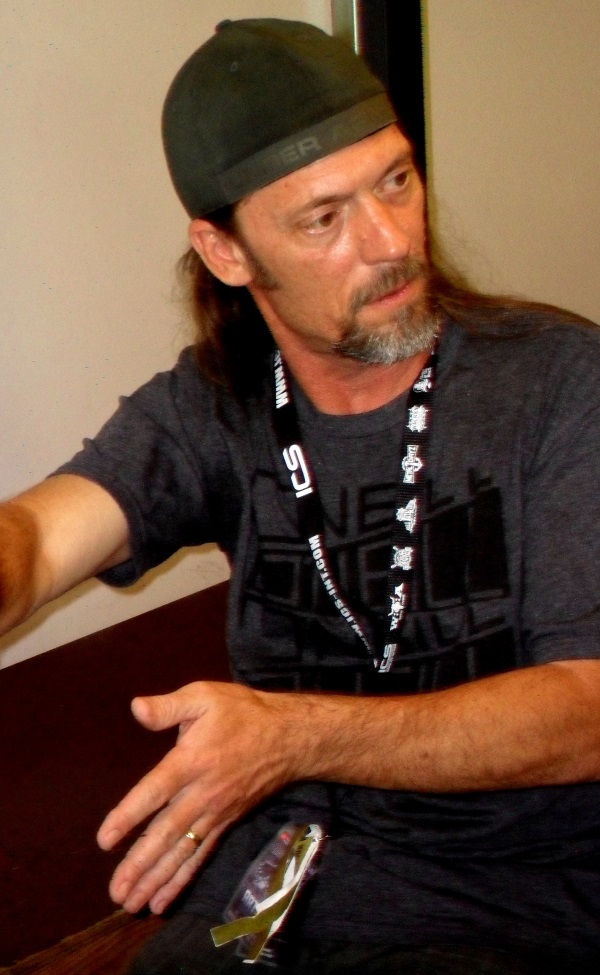
You even recorded that Wacken show.
Wiley: Yeah, that was our first show back. It’s been released and, to our surprise, it performed well. We thought it was a one-time stint, we bring our families to Europe, we relive our old days and it will be cool so go ahead and film it, we’ll capture this and it will be great. What we didn’t know is we will come back every year for ten years now. Nine years later, we’re sitting here having this talk and we’re back. And what we didn’t know is that while we were there, we would discover that we’re still viable. So it’s been a very pleasant, unintended surprise, weren’t aspiring to reform and go conquer the world. We made sense of doing it and, to our surprise, we were warmly received. We released the double set DVD and CD and it performed well, suggesting there’s a market which caused us to digitize and re-release the old records. People are buying them and a new generation of people is learning Surf Nicaragua. And we’re out supporting this idea, we’re kind of celebrating our back catalogue and having a great time doing this stuff. We don’t aspire to do any more records.
Why is that?
Wiley: There are a couple of reasons. It’s like a well of water. As long as there’s water in it, we drink from it. But at some point, we have to bring the bucket up and move to a new well. Our well ran dry, we became uninspired, our focus was on our families and there just wasn’t new material. We recorded whatever songs we wrote. We wrote ten songs, ten songs on the record. If we wrote four songs, we did an EP. We never wrote twenty and picked the best twelve. Whatever songs we write, we record them. And we stopped writing and recording. And now, it’s tough to watch that some of the great bands from our time do new stuff, Death Angel, Testament and so on. And we have to rethink our position. But we always remember going out to see Van Halen with Women And Children First, me being a young guitar player, knowing all the lyrics, getting a shirt and trying to keep it for a hundred years. It was such a big deal. Then we remember going back to see them as thirty year olds, hoping for that old school vibe. But it was Sammy Hagar, they were selling us a record we never heard, they played three old songs and then they did a medley, thirty seconds of each song, and then they played an hour of stuff we weren’t there for. So we were nostalgic, we wanted to see Van Halen and we would kind of leave like “What the fuck’s just happened?” For me, it was Van Halen and we all have our own similar experience with some favorite band when we were trying to relive that moment. And when the phone rang for us, we weren’t confused like: “Oh, they’re anticipating we have the next best thing in our back pocket.” No, we’re not confused. They want to relive those days and we feel compelled to deliver. We have no new stuff. You connected with the music at some point in your life and you would really enjoy hearing all of that, with no distraction. I have to admit there have been a lot of people who would love to hear a new Sacred Reich record but we’re all nearly fifty, we got kids who are twenty, it’s just a different world for us so it’s kind of hard to get our head around how we even go onto that mode. I own a couple of restaurants, I stay very busy and this is hard to understand how to go into that world. We were offered some cool opportunities to do US tours with Overkill but restaurants are much more predictable and I would eventually pay up a house at this pace but this uncertain thing going to play the rock star just doesn’t make sense. But the European crowd is so authentic and this is a celebration. I mean, a US tour means a bunch of 400 seat clubs. Maybe if you’re lucky, you can get a couple thousand people in New York or California. But they’re not like this, we’re not doing this across the country in the US. If we did, we would probably rotate: 2016 Europe, 2017 US. We can take two or three weeks off, we can’t devote eleven weeks a year into music, it’s not going to happen. So we try to be realistic and if we have a couple of weeks out to do music, wouldn’t you want to be at European festivals? Absolutely you would, you wouldn’t want to be in stinking bars in Idaho. It’s not that there’s anything wrong with Idaho, but if you’re left to prioritize and have a limited amount of time, wouldn’t you want to make better money and bigger situations, big beautiful outdoor festivals with diehard fans? So we opted to go to Europe whenever they invite us.
And your families surely appreciate what you do.
Wiley: It’s a big deal for us. There was an opportunity for us to make some money and bring it home but at our age, we understand that it’s not about money. Somebody who’s rich has a life experience. You spend your whole life pissing people off collecting money but when you stop breathing, new people are going to fight over your old money. Richness comes from experience. This is a unique experience for us, a bunch of guys who grew up together in Scottsdale, Arizona and we told a lot of stories to our kids and our families over the years about what we used to do. And this idea that we can bring them along and show them is a beautiful blessing that we just embrace and celebrate.
Are still in contact with former drummer Dave McClain (Machine Head)?
Wiley: We don’t talk weekly or even monthly, Facebook is how we usually connect but he’s a blood brother of mine. He was in the band as long as Greg was and did as many records as Greg did. So if Sacred Reich is a 100% pie, Dave McClain is 50% of that pie. That’s not to diminish Greg in any way, this is the original line-up and it’s something very warm and fuzzy for all of us hanging out and celebrating this but Dave McClain was absolutely Sacred Reich. He’s our brother, we’re super proud of his success with Machine Head, we cheer him on. We were winding down, he was winding up and when he saw the opportunity to join Sacred Reich, he jumped on it. But he didn’t realize he was getting in on the last two records. He didn’t know that, he couldn’t know that and we didn’t know that. That was just a natural progression for our experience. So we’re very thankful that his talent earned him the attention of Machine Head who adopted him smartly and quickly and he’s been enjoying a lot of success with them. That’s just beautiful. In 2012, he joined us on stage a couple of times and when he’s available, we always seek the opportunity to shake hands and share some fun. Dave McClain is an amazing guy, an important part of our history, we have nothing but good stuff to say about him.
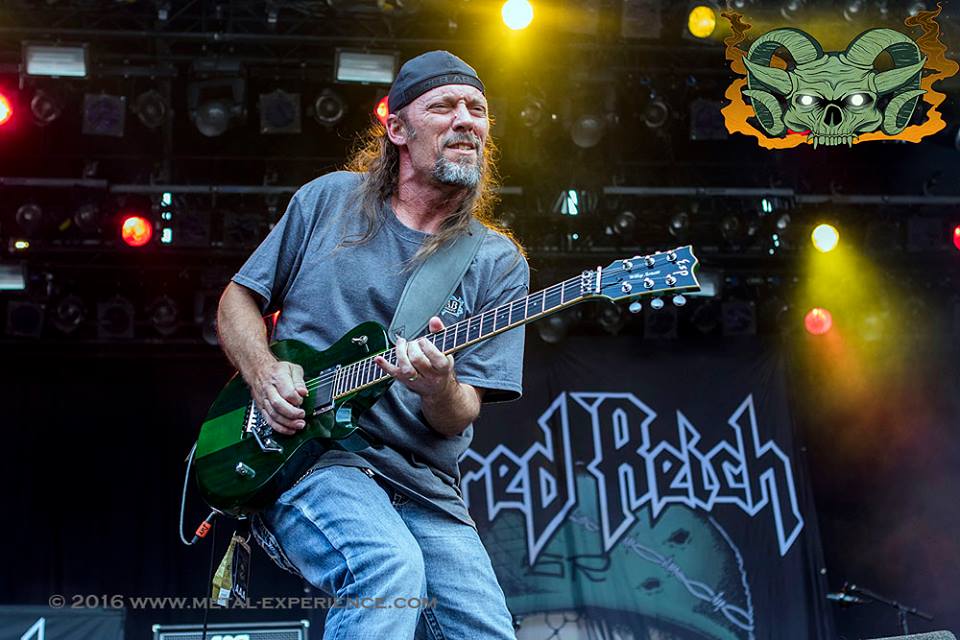
How well do you think the two albums made with him, Independent and Heal performed? Would you say those are less popular among your fans than the previous ones? Are you happy with those records?
Wiley: It’s interesting. When I listen to Ignorance, all I hear is our influence. I talk about Sacred Reich being a cover band. Slayer, Metallica, S.O.D. When I listen to Ignorance, all I hear are those influences. I don’t hear Sacred Reich. I try to respect and understand that it was our first record and we have our own sound but to me, it was like we got this riff from this song, we got that chorus from that song. We switched it up but it’s just full of our influence. I think The American Way was the first time where we kind of ran out of influence and looked at our own records, Surf and Ignorance. We took influence from our band to figure out who we were instead of Slayer, S.O.D., Metallica. For the first time, they were our riffs, 100%. I’m not suggesting we stole stuff but I can very heavily hear our young, in-the-bedroom influences from playing all those cover tunes all throughout Ignorance. And then there was this progression we thought natural from The American Way to Independent. We did lose some fans at Independent but we picked up more. Metallica is going to the Black Record and the metal community thinks they sold out, all of the sudden all college kids in America who never heard of Metallica are wearing the black shirt. Those were weird times. Kurt Cobain became a zillionaire, the alternative Seattle thing started to move in, metal started to get pushed aside a little bit and we put out Independent. We also picked up some college kids and I remember the authentic metal world considered these new metal guys posers. Imagine you run into your six year old buddy whom you haven’t seen for twenty years and you’re disappointed ‘cause he doesn’t act like he’s six. We all kind of grew up and this happens musically as well, for all bands. This isn’t a defense for us and our catalogue, this is a defense for Metallica, for Slayer, for everybody. Maybe some people stayed true better than others but I think there’s a natural progression. Every time you do a record, you learn something about yourself, about the studio and how things work: mike placement, seven string guitar... There’s a natural progression and, inevitably, you won’t write the same record six times which will piss people off. A lot of people agreed The American Way was great and Independent was more of the same. It was different that The American Way but it was a natural progression for the band. Sometimes I look at pictures of myself from high school at 14 and think how awkward I was. My hair was growing weird, my teeth were weird… Awkward teens. And our records are an accurate snapshot of us at that time. Maybe we look back and think this or that picture is not our favorite one but it’s honest, it’s real, it’s what it is. We were never using science to understand what consumers wanted, we were writing songs and recording them and there was a progression. Overtime, we slowed down, we thought that heavy was cooler than fast. You don’t like this picture of us? O.K. but at least it’s accurate. This is what we look like right now, this is what we sound like right now, this is where we’re at. Love it or hate it, we’re going to do it whatever it is, you’ve got to deal with it. I think Heal was the first time we didn’t pick up a lot of new fans and we lost some which probably helped us make this decision to wind down. Instead of our venues getting bigger, venues were getting smaller. Instead of t-shirt sales picking up, t-shirt sales were declining so we thought “Why do we do this? We should go and be home with our families. We ran our course. Nirvana rule the world, we had a good run, no hard feelings.” There’s not a bad guy in this story. We played hard, we enjoyed the success that we earned. We were there, did the shows, did the records. It was a beautiful experience, it just ran its course. So again, over a decade off, Thomas Kreidner of ICS, phone call, Wacken 2007, turned the machine back on. So now we’re at this weird stage where how many years can we come back and play the old stuff before we need to A: stop and take another break or B: produce something new. It’s not obvious to us so sometimes we debate about that. I talk to Phil who’s a key, a critical factor in creating new stuff. He did 100% of the lyrics and 50% or better of the music. He’s a bass player so he always needs to turn one note into chords and we certainly would impact the sound. Every band has a formula and that was our formula. If we would change the formula, it would be like I want my chocolate cake but now we don’t use flour. You got to use the ingredients or else you got to call it something else, it can’t be chocolate cake without chocolate. It’s a little bit loose but it’s an idea of how we look at it. That keeps us in check. Integrity’s important, we never used hair spray, eyeliner, flashy lights, pyrotechnics. Black clothes, hair down, four count, go, that’s our style. We got to honor that. What do we do now? Look at data, try to figure what people expect from us and deliver that? No, of course not, we never done that. There was a point a couple of years back when Phil and I had some half-lyrics for a song called Save Yourself. It was kind of a rant: “Stop telling me how you’re going to fix me, fix everything else and save your-fucking-self.” That was the idea but it got to a point where it was uninspired. We thought we would come back and have a fresh look but it’s not something we’re actively pursuing. We’re enjoying this opportunity to come back, we’re taking advantage of it by bringing our family over here. We don’t care about coming home with extra money, we care about bringing our kids home so that they can say “We’ve been to Europe where dad played these festivals.” That’s the value of this for us, not aspiring to be the next big thing. If we would ever make a new record, it would be very natural, spontaneous. We’ll see. I don’t expect that but at 48 years old, I finally learned don’t ever say never.
And, to finish this interview on a funny note: is it true that almost an entire series of promo photos of the band for The American Way shot at the Grand Canyon turned out to be impossible to use because the eyes of most band member were closed on the pictures?
Wiley: I also heard that. I don’t remember it but I heard that we spent a lot of money on photographers and in the end, we couldn’t even used this shit ‘cause the guys’ fucking eyes were closed. Me in particular, I think it was a group problem, ‘cause maybe we were smoking too much pot. We went out and had some fun and it’s a little bit of a stretch that nothing useable came from that intent but it’s also probably true that in ten hours we got an hour worth of stuff. So this is what it is. We were always spontaneous young kids, we loved to have fun when we were out. Maybe sometimes we didn’t take things as seriously as we should have, that’s certainly possible but there was never a malicious intent to waste people’s resources and time. We were just trying to laugh and have fun.
Fotók: Eus Straver, Dr. Narcisse
https://www.facebook.com/Sacred-Reich-24848950195

